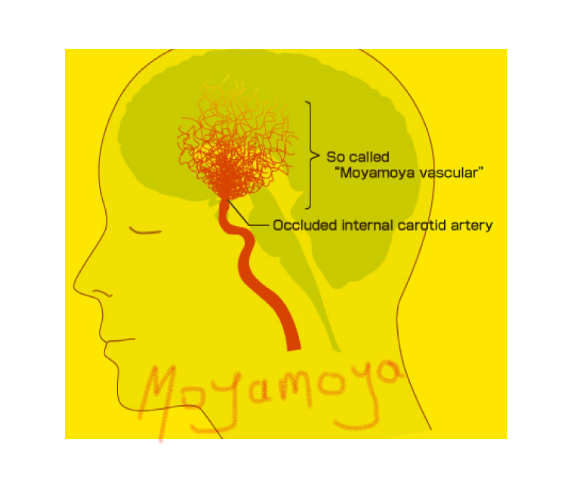Quick Overview
Moyamoya disease is a rare and complex cerebrovascular disorder characterized by the progressive narrowing of the arteries at the base of the brain.
The name “Moyamoya” means “puff of smoke” in Japanese, describing the appearance of the collateral blood vessels that form to compensate for the blockages. This can lead to a number of complications, including stroke, transient ischemic attacks (TIAs), and cognitive decline.

Table of Contents
Causes
The exact cause of Moyamoya disease remains largely unknown. While genetic factors are believed to play a role, the majority of cases are sporadic and not inherited.
Some studies suggest that there may be a genetic predisposition that, when combined with environmental factors, triggers the development of the condition. Research in this area continues to expand our understanding of the disease’s origins.
Read about Lymphangioleiomyomatosis: Causes, Symtoms, Treatment
Signs and Symptoms
Signs and symptoms may include;
- Headaches: Frequent and severe headaches are common in individuals with this disease.
- Weakness or Paralysis: Some may experience muscle weakness or even paralysis, particularly on one side of the body.
- Speech Difficulties: Speech problems, such as slurred speech or difficulty in finding the right words, can occur.
- Seizures: Epileptic seizures may develop, affecting both children and adults.
- Vision Changes: Vision problems, including blindness in one eye, can result from the reduced blood flow to the eyes.
- Cognitive Decline: It can lead to cognitive decline and memory issues.
Diagnosis
Diagnosis of this disease is based on the person’s medical history, physical examination, and imaging tests. Imaging tests, such as magnetic resonance angiography (MRA) and computed tomography angiography (CTA), can be used to look for narrowing or occlusion of the arteries in the brain.
Complication
The main complication of moyamoya disease is stroke. Stroke occurs when the blood supply to part of the brain is interrupted. This can damage brain tissue and lead to a variety of symptoms, depending on the area of the brain that is affected.
Other complications of moyamoya disease include;
- Transient ischemic attacks (TIAs): TIAs are brief episodes of stroke symptoms that usually last for less than 5 minutes. TIAs are a warning sign of an impending stroke.
- Cognitive decline: It can lead to cognitive decline, including memory loss, difficulty thinking clearly, and problems with attention and concentration.
- Hydrocephalus: Hydrocephalus is a condition in which too much cerebrospinal fluid builds up in the brain. This can put pressure on the brain and lead to symptoms such as headaches, nausea, vomiting, and vision problems.
Treatment
There is no cure for moyamoya disease, but there are treatments available to improve blood flow to the brain and reduce the risk of stroke. Treatment options include:
- Medications: Medications such as aspirin and clopidogrel can be used to prevent blood clots from forming.
- Surgery: Surgery is often recommended for people with this disease who are at high risk of stroke. The goal of surgery is to create new pathways for blood to flow to the brain.
Moyamoya Disease Life Expectancy
The life expectancy for people with this disease varies depending on the severity of the condition and the presence of complications. However, with early diagnosis and treatment, most people with moyamoya disease can live long and productive lives.
Also read about Beck’s Triad: Symptoms, Causes, and Treatment
Questions
Q: What is the difference between moyamoya disease and moyamoya syndrome?
Moyamoya disease is a specific cerebrovascular disorder, while moyamoya syndrome is a broader term that encompasses moyamoya disease and other conditions that can cause similar narrowing or occlusion of the arteries in the brain.
Q: Is moyamoya disease contagious?
No, moyamoya disease is not contagious. It is a non-communicable disorder.
Q: Can pregnancy and childbirth affect Moyamoya disease?
Women of childbearing age may have concerns about how pregnancy and hormonal changes might impact the disease.
Q: Is there a support network or patient community for those with Moyamoya disease?
Many patients find it helpful to connect with others who are going through similar experiences.
Q: What are the emotional and psychological effects of living with Moyamoya disease?
It’s essential to address the emotional and psychological aspects of coping with a chronic medical condition.
Q: How can I reduce the risk of complications, such as stroke or hemorrhage?
Patients often want to know what steps they can take to minimize the risk of severe complications associated with Moyamoya disease.
